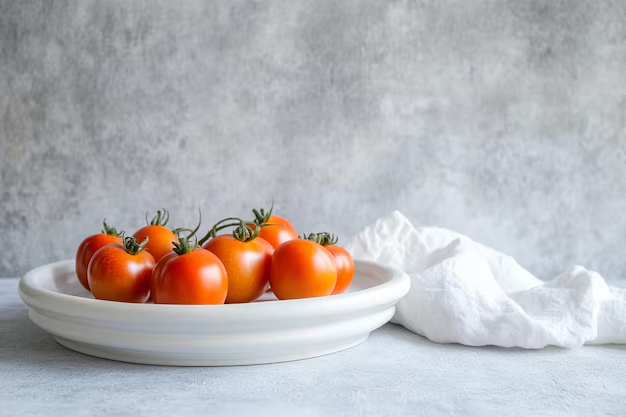Should You Keep Tomatoes in the Refrigerator? Your Essential Guide to Freshness 🌿
When it comes to storing fresh produce, tomatoes often stir up a divisive debate. Should they be kept in the cool confines of a refrigerator or bask on the countertop until they ripen to perfection? Let's delve into the nuances of this juicy topic, exploring the effects of refrigeration on tomatoes, the science behind their storage, and practical tips for keeping them fresh longer.
🍅 Understanding Tomatoes: A Brief Overview
Tomatoes are more than just a staple in salads—they're a versatile fruit (yes, fruit!) bursting with flavor and nutritional benefits. Beyond their culinary flexibility, tomatoes are rich in vitamins A, C, and K, fiber, and antioxidants like lycopene, which contribute to overall health. Given their importance, understanding how to store them correctly is crucial to maintaining both taste and nutrients.
The Anatomy of a Tomato
To comprehend why storage conditions matter, considering a tomato's composition is helpful. The fruit comprises a delicate balance of acids, sugars, and volatiles—compounds that contribute to its unique flavor profile. The skin acts as a barrier, protecting the flesh inside while allowing gases to permeate, a factor that plays into how and where you should store them.
🚪 The Great Tomato Storage Debate
Countertop vs. Refrigerator: The Main Considerations
At the heart of the tomato storage debate is a balancing act between preserving texture and extending shelf life. Here’s a breakdown to clarify the benefits and drawbacks of each approach:
Countertop Storage: Pros and Cons
Pros:
- Flavor Preservation: Allowing tomatoes to ripen fully at room temperature can enhance their natural flavor compounds, making them taste richer and sweeter.
- Texture Maintenance: Tomatoes stored on the counter typically retain their firm yet juicy texture better than refrigerated ones.
Cons:
- Limited Shelf Life: Exposed to ambient temperatures, tomatoes may spoil more quickly, especially in hot climates.
- Pests and Bruising: When stored on a counter, tomatoes are more susceptible to bruising and can become a target for fruit flies.
Refrigerator Storage: Pros and Cons
Pros:
- Extended Freshness: The cooler environment can slow down the ripening process, thus extending the fruit's usable lifespan.
- Protection from Pests: A refrigerator shields tomatoes from pests and physical damage that can occur on a countertop.
Cons:
- Flavor Loss: Cold temperatures can mute the flavor profile of tomatoes, impacting the eating experience.
- Texture Changes: Refrigeration can cause tomatoes to become mealy and lose their signature juiciness.
🔬 The Science of Tomato Storage
How Cold Affects Tomatoes
Cold storage inhibits the activity of enzymes responsible for the synthesis of flavor compounds. This means that while refrigeration may slow decay, it also dampens the tomato's natural sweetness and complex aroma.
Impact on Nutrients
Although refrigeration helps in preserving vitamins and minerals somewhat longer, the trade-off for flavor and texture is noteworthy. Thus, understanding when and how long to refrigerate tomatoes can optimize both their taste and nutritional value.
🥗 Practical Storage Tips for Maximum Freshness
General Guidelines
- Ripeness Matters: Store fully ripe tomatoes in the refrigerator if you can't consume them within a couple of days.
- Cool but Not Cold: Ideally, the storage temperature should be just above refrigeration—like a cool pantry or cellar.
- Handle with Care: Minimize handling to avoid bruising, which can accelerate spoilage.
Reviving Refrigerated Tomatoes
If tomatoes must be refrigerated, try bringing them back to room temperature before eating to help restore some flavor. Allowing them to sit out an hour or two can make a noticeable difference in taste and texture.
🧑🍳 Culinary Considerations
When to Choose Refrigeration
- Use refrigeration when using tomatoes for cooked dishes, where texture is less of a concern compared to fresh preparations.
- If you've made a tomato-based salsa or sauce, refrigeration is essential to prevent bacterial growth.
When to Opt for the Countertop
Reserve countertop storage for tomatoes destined for fresh salads or as a topping on burgers, where maintaining their texture and flavor is paramount.
📝 Quick Reference Summary
Here's a handy, visually distinct summary for quick reference:
| 🍅 Storage Method | 👍 Best For | ⚠️ Avoid When |
|---|---|---|
| Countertop | Preserving flavor & texture | You cannot consume them soon |
| Refrigerator | Extending shelf life & reducing spoilage | You want optimal taste in fresh dishes |
Final Takeaway 🌟
Deciding whether to refrigerate tomatoes depends on your culinary goals and storage capabilities. While cool temperatures can help extend lifespan, they may compromise flavor and texture, critical factors in fresh dishes. Ultimately, the best practice involves a strategic approach—taking advantage of both countertop and refrigerator storage where situationally appropriate.
By understanding these fundamentals, you'll be well-equipped to make informed decisions about tomato storage, ensuring every juicy bite is nothing less than delightful. Enjoy your next meal confident in your newfound tomato expertise!

